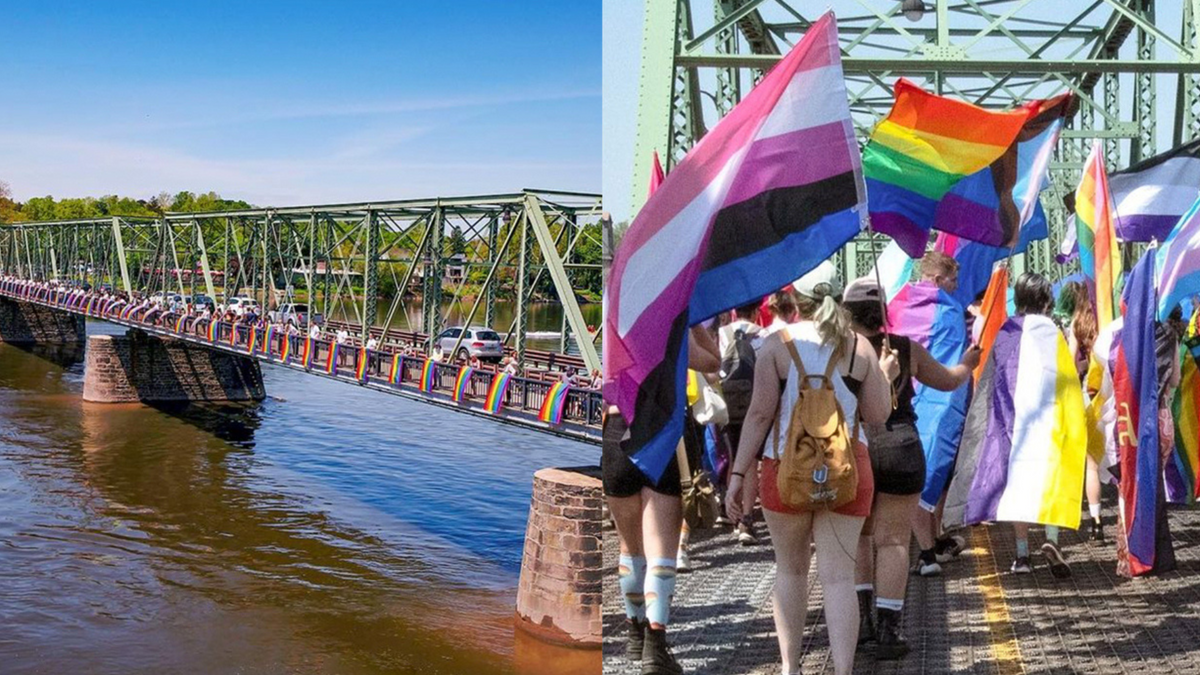Purchase tickets to attend the in-person screening event on November 4th at Bucks County Playhouse.
equalpride has partnered with 'Queer Cuts: New Hope' as an exclusive media partner and will host all five short films online for free from November 6th to November 7th at 6 PM ET/3 PM PT on the Advocate Channel App for your mobile phone and your favorite streaming device.
Apple Store - Google Play
Roku - Apple TV - Fire TV - Google TV
Learn more about Creative Hope Initiative by visiting queercuts.com.

The town of New Hope, Pennsylvania is a vibrant community filled with a creative spirit that honors LGBTQ+ identity and history. Known for their inclusivity, the New Hope of today welcomes all people and cherishes everyone who comes to visit. Not all small towns are like this, and even if they are, that doesn’t mean they always were. But that’s not the case with New Hope, because ever since they were “discovered” in the 1940’s, they were a haven for all kinds of people.
Artists, stage performers, and people attracted to that lifestyle were known to hang out in New Hope, creating a melting pot of different people with so many different stories to tell. That past has informed New Hope’s present, becoming a hub for all artsy types with various handmade shops and a robust theater scene that keeps the history of this charming town going. And as a celebrated destination for LGBTQ+ travelers since the 1940’s, this town’s past has turned this cherished destination into a home for so many queer stories.
This year, New Hope's contemporary queer stories are going to be told as a part of The Creative Hope Initiative with “Queer Cuts: New Hope.” The Creative Hope Initiative, created by production studio TRAVERSE32, funded five filmmakers (Hansen Bursic, Joy Davenport, Natalie Jasmine Harris, Kase Peña, and Kristal Sotomayor) to create short documentaries highlighting local queer stories in New Hope, Pennsylvania.
With the help of New Hope residents Daniel Brooks, founder of New Hope Celebrates (NHC), a 501(c)(3) LGBTQ+ non-profit highlighting local retail, hospitality, and professional partners through marketing opportunities, educational activities, and cultural events for locals and visitors, and local filmmaker Sara Scully, who together co-founded New Hope Celebrates History, the stories of LGBTQ+ residents today will be shared. But what about the stories of New Hope’s queer past? Luckily, when Sara was uncovering history for her own film project on New Hope, she was able to uncover photographs from residents' private albums with stories attached. With archival photography of New Hope as it was in the 1970’s, Sara describes what it was like to be LGBTQ+ in the small town.

Bastille Day on Mechanic St., Photo credit: Robert Ebert.
In 1975, New Hope celebrated Bastille Day on Mechanic St, and the experience was a perfect encapsulation of what life was like. “This Mechanic St medley captures the spirit of downtown New Hope in the 70’s: A relaxed small town with the cosmopolitan flair of a city, where gay, straight, trans, and curious friends of all ages mixed and enjoyed fantastic times at outdoor restaurants, block parties, and late great places like Chez Odette’s, which is now the Odette’s River House hotel,” Sara shares.
She continues on, “This Bastille Day celebration in 1975 took place on Mechanic St. in downtown New Hope with a block party and everyone in town, all ages, were invited. There was dancing in the streets as well as a ‘drag race’ where anyone, especially those in drag, could enter to race up Mechanic St. hill and back down.”

Bastille Day on Mechanic St., Photo credit: Robert Ebert.
That unforgettable experience is typical of the stories told in New Hope from its LGBTQ+ residents. And when considering the history of a queer space, Sara shares how The Raven (the subject of Hansen Bursic’s documentary), a gay bar that became a safe haven for all queer people – especially trans people, was an LGBTQ+ space before it even became a bar, known as La Camp.

The Raven pool, Photo credit: Robert Ebert.
“La Camp was a place we knew and loved, long before it was sold and turned into The Raven,” Sara says. “La Camp was opened by Bruno Cesarone, Les Dille, and partners in 1976, as an LGBT restaurant-hotel destination when many people had to go on vacation to be their true LGBT selves. Before Bruno and Les owned it, the site was a simple motel called The Brookmore. La Camp lasted just a few years until it was purchased and turned into The Raven in the late 1970’s/early 1980’s. The Raven reigned as the queer meeting place for decades, hosting weekly drag shows, a lively pool club, dance club, trans weekend meet-ups and more.”

The Raven reunion, Photo credit: Robert Ebert.
These are just a couple anecdotes of the rich LGBTQ+ history New Hope has to offer, and luckily the stories of today will be cemented in history for everyone to learn.
























































































Here's our dream all-queer cast for 'The White Lotus' season 4